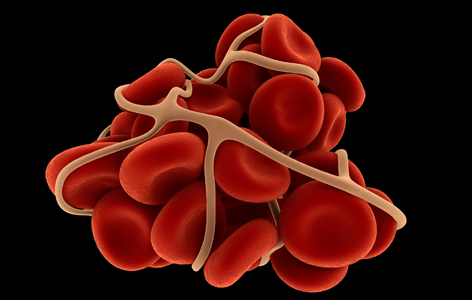Home page Description:
Diabetes drug could lower risk of heart attacks and strokes by inhibiting blood clotting.
Posted On: May 02, 2016

Image Caption:
Blood clots, which consist of blood cells surrounded by long strands of fibrin protein (pictured above), are instrumental for the repair of damaged blood vessels.
Glucagon-like peptide 1 receptor agonists (GLP1RAs) are a type of medication prescribed to treat people with type 2 diabetes. GLP1RAs work by lowering blood sugar levels, which are abnormally high in diabetes. In some clinical trials, this medication was found to provide an additional and unexpected health benefit to people with diabetes: it decreased the risk of adverse cardiovascular events such as heart attacks and strokes. In light of these observations, researchers are working to understand how GLP1RAs affect cardiovascular health.
Recent findings from TGHRI Director and Senior Scientist Dr. Mansoor Husain have shed further light on how GLP1RAs work and may explain how these drugs provide some of their cardioprotective effects.
Through several experiments, the researchers showed that exenatide, a commonly prescribed GLP1RA, interfered with blood clotting. They found that exenatide inhibited the activity of purified platelets, which are specialized blood cells involved in clot formation. They also showed that the drug interfered with the formation of clots in human and mouse blood samples. These results were then confirmed in an experimental model of type 2 diabetes, as well as a model of blood vessel injury.
“These findings provide a potential mechanism for improved cardiovascular outcomes in people with diabetes treated with GLP1RAs, as well as a potential rationale for their use in people who are at higher risk of heart attacks and strokes,” says Dr. Husain.
This work was supported by the Canadian Institutes of Health Research, the Heart and Stroke Foundation of Canada, Merck Canada and the Toronto General & Western Hospital Foundation.
Glucagon-like peptide-1 receptor activation attenuates platelet aggregation and thrombosis. Cameron-Vendrig A, Reheman A, Siraj MA, Xu XR, Wang Y, Lei X, Afroze T, Shikatani E, El-Mounayri O, Noyan H, Weissleder R, Ni H, Husain M. Diabetes. 2016 March 2. PMID: 26936963. [Pubmed abstract]
Recent findings from TGHRI Director and Senior Scientist Dr. Mansoor Husain have shed further light on how GLP1RAs work and may explain how these drugs provide some of their cardioprotective effects.
Through several experiments, the researchers showed that exenatide, a commonly prescribed GLP1RA, interfered with blood clotting. They found that exenatide inhibited the activity of purified platelets, which are specialized blood cells involved in clot formation. They also showed that the drug interfered with the formation of clots in human and mouse blood samples. These results were then confirmed in an experimental model of type 2 diabetes, as well as a model of blood vessel injury.
“These findings provide a potential mechanism for improved cardiovascular outcomes in people with diabetes treated with GLP1RAs, as well as a potential rationale for their use in people who are at higher risk of heart attacks and strokes,” says Dr. Husain.
This work was supported by the Canadian Institutes of Health Research, the Heart and Stroke Foundation of Canada, Merck Canada and the Toronto General & Western Hospital Foundation.
Glucagon-like peptide-1 receptor activation attenuates platelet aggregation and thrombosis. Cameron-Vendrig A, Reheman A, Siraj MA, Xu XR, Wang Y, Lei X, Afroze T, Shikatani E, El-Mounayri O, Noyan H, Weissleder R, Ni H, Husain M. Diabetes. 2016 March 2. PMID: 26936963. [Pubmed abstract]




